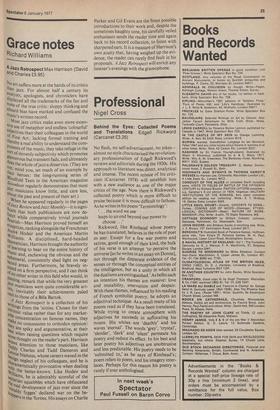Professional
Nigel Cross
Behind the Eyes: Collected Poems and Translations Edgell Rickword (Carcanet £3.25) No flash, no self-advertisement, no jokes— almost no style characterised the revolutionary professionalism of Edgell Rickword's reviews and editorials during the 1920s. His approach to literature was direct, analytical and intense. The recent reissue of his criticism (Carcarnet 1974) will establish him with a new audience as one of the major critics of the age. Now there is Rickword's collected poetry which is more difficult to praise because it is more difficult to fathom. As he writes in his poem 'Terminology':
`.. . the word we use leaps to an end beyond our power to choose ..
Rickword, like Rimbaud whose poetry he has translated, believes in the role of poet as seer. Except for a few war poems and satires, good enough of their kind, the bulk of his verse is an attempt `to perceive the universe [as he writes in an essay on Donne], not through the disparate evidence of the senses or through the conceptual entities of the intelligence, but as a unity in which all the dualisms are extinguished.' As befits such an intention his themes are massive: love and mutability, enervation and despair. With these themes, influenced by his reading of French symbolist poetry, he adopts an adjectival technique. As a result many of his poems read as if they have been translated. While trying to create atmosphere with adjectives he succeeds in suffocating his nouns. His whites are 'deathly' and his waves 'eternal'. The words 'grey', 'crystal', 'slender', 'dark' and 'silent' permeate his poetry and reduce its effect. In his best and later poetry his adjectives are unobtrusive and less predictable. His poetry needs to be 'submitted to,' as he says of Rimbaud's; poem refers to poem, and his imagery interlaces. Perhaps for this reason his poetry is rarely if ever anthologised.


































 Previous page
Previous page